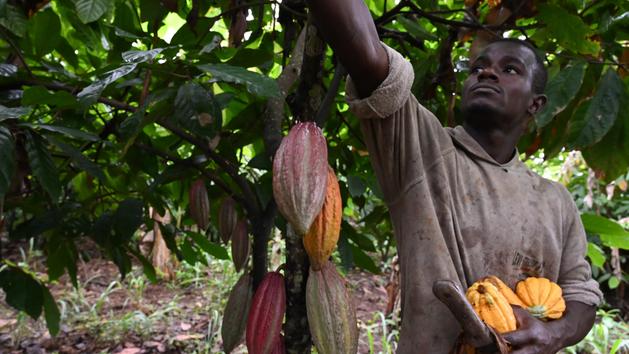Preserving cocoa plantations, without seeing the prices of the main raw material soar: this is the dilemma that chocolate manufacturers have been facing for several years.
This year will not escape the rule.
This Thursday begins the traditional harvest of cocoa beans in Côte d'Ivoire and Ghana, the two largest producers with 65% of global volumes.
October 1, World Cocoa Day, which also coincides with the entry into force of a new system: the “
Living Income Differential
” or “
decent income bonus
”.
Wanted in concert by the governments of the two countries, this premium of 400 dollars per tonne of cocoa was planned more than a year ago.
This drove up world prices by 30% in the second half of 2019. It is paid by manufacturers or their suppliers (Barry Callebaut, Cargill, Mars, Nestlé, Ferrero ...) to, according to governments, ensure that the hundreds of thousands of cocoa farmers, often on very small farms, earn an income equivalent to at least 70% of the world price (currently around $ 2,580 per tonne).
And this even if prices come down, which is likely at the dawn of a 2020/2021 harvest which promises to be fruitful, and in a context of health crisis which weighs on prices.
"
As cocoa is often bought in advance on futures markets, this premium has in fact already been often paid by manufacturers for several months
", specifies Bénédicte Chatel, creator of the site specializing in African agricultural raw materials CommodAfrica.
Sustain the sector
Officially, the chocolate giants, from Nestlé to Mars via Mondelez, Hershey's, Barry Callebaut, Cémoi or Ferrero, all applaud this measure.
Like the smallest chocolatiers, often very small businesses or SMEs.
This Thursday, the French chocolate union which brings together 85% of the profession recalls its full support for the initiative imposed by this "
OPEC of cocoa
".
If they had to comply with it, they also know that it is one of the main levers to prevent planters from turning to other crops.
Or that governments, which have also imposed a floor price of $ 2,600, close their doors to them.
Which would be a disaster, given that cocoa only grows in tropical areas, and Côte d'Ivoire and Ghana are essential suppliers.
“
We have been working directly in the field for a long time on these issues of income and farm profitability with governments,”
supports Cathy Pieters, who heads Mondelez's sustainable cocoa program, called Cocoa Life
.
With the $ 400 million that we have invested over the past 10 years, the 175,000 producers included in our program earn on average 22% more
”.
Uncertain guarantees
But this effort, which increases the cost of raw materials for ice creams, candies or chocolate bars by 15%, is a very significant additional cost for manufacturers.
"
It is considerable,
" confirms Cathy Pieters at Mondelez where, as with its competitors, we remain silent when it comes to saying who will take the final score.
Chocolatiers hope in fact to promote some of these efforts with their distributor customers, on ethical and fair-trade products popular with consumers.
The bigger ones will also surely have stronger kidneys to cover part of the costs.
Finally, shelves could see the appearance of smaller formats to try to contain the face value of the product, like what was done in 2013 and 2014 during a previous violent surge of price fever.
There remains the crucial question of the effectiveness of the measure in plantations, which also provides that in the event of a sharp rise in prices, the premium will be set aside to cushion producers for future drops.
From this point of view, the next few months will be crucial to see if the system works, while the efforts of manufacturers have not always had the effects as quickly as expected.
“
Whether or not these bonuses reach the producer is ultimately at the discretion of governments.
Even if we have verification mechanisms in the field
, ”recognizes Cathy Pieters.
"
We still lack visibility on the precise cogs that will bring these sums down to the plantations,"
confirms Gilles Rouvière, the general secretary of the Syndicat du Chocolat, which brings together 64 companies
. We will therefore remain very attentive and concerned in the coming weeks of the effective implementation of the system
”. This is essential for the credibility of these efforts with consumers, who are also likely contributors. And above all the quality of the relationship between producing and industrial countries, a delicate but strategic subject in the chocolate production chain.

